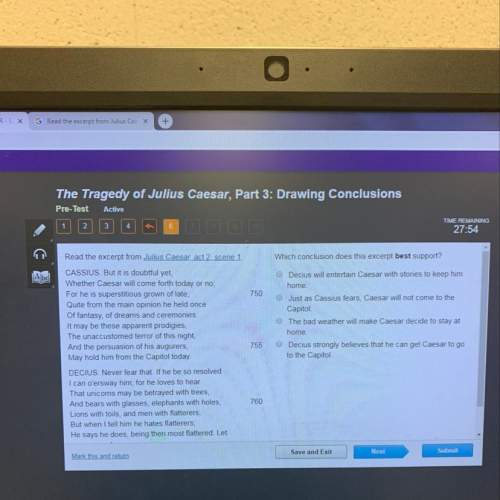Read this passage from Act 3, Part 3, of The Crucible.
DANFORTH: In an ordinary crime, h...

Read this passage from Act 3, Part 3, of The Crucible.
DANFORTH: In an ordinary crime, how does one defend the accused? One calls up witnesses to prove his innocence. But witchcraft is ipso facto, on its face and by its nature, an invisible crime, is it not? Therefore, who may possibly be witness to it? The witch and the victim. None other. Now we cannot hope the witch will accuse herself; granted? Therefore, we must rely upon her victims—and they do testify, the children certainly do testify. As for the witches, none will deny that we are most eager for all their confessions. Therefore, what is left for a lawyer to bring out? I think I have made my point. Have I not?
Which technique does the author use to convey an implicit meaning in this passage?
The Crucible, Act 3, Part 3
humor; Danforth rambles on in a way that is intentionally boring to the point of comedy
satire; Danforth’s description of witchcraft as an “invisible crime” criticizes similar accusations of communist beliefs in the 1950s
irony; Danforth declares that the witnesses do not need lawyers, but he himself is a lawyer
sarcasm; Danforth is overly simplifying his explanation to mock the people in court

Answers: 2
Other questions on the subject: English


English, 22.06.2019 06:00, Gtx014
In january 2014 and i started 1 million pennies project she put donation jars in school and shops and set up a webpage to of said donations online her gold was to collect 1 million pennies or 1000 chandra’s planned to give the money to a group called growing food for the group plant gardens and deliver the products it grows to people in need
Answers: 1

English, 22.06.2019 07:10, tdahna0403
What is the significance of the above statement in relation to the play’s conclusion? oedipus treats his inferiors poorly but ultimately grants them the same respect he grants to nobility. while teiresias appears to be mocking oedipus, the real message is one of warning about the forces working against the king. oedipus earns great fame for answering the riddle of the sphinx but ultimately loses his crown to a common man. just as oedipus is unable to conceive that he has done wrong in the past, he is unable to imagine that his enviable position is impermanent.
Answers: 1

English, 22.06.2019 11:20, xeno777
Read the following excerpt from leslie marmon silko’s story "the man to send rain clouds." the priest stared down at his scuffed brown loafers and the worn hem of his cassock. “for a christian burial it was necessary.” his voice was distant, and leon thought that his blue eyes looked tired. “it's o. k., father, we just want him to have plenty of water.” the priest sank down into the green chair and picked up a glossy missionary magazine. he turned the colored pages full of lepers and pagans without looking at them. “you know i can't do that, leon. there should have been the last rites and a funeral mass at the very least.” leon put on his green cap and pulled the flaps down over his ears. “it's getting late, father. i've got to go.” which of the following statements best describes the thematic significance of this dialogue? this dialogue emphasizes the ongoing personal conflict between leon and father paul. this conversation between leon and father paul makes it clear that they will never come to an agreement. leon’s and father paul’s differing perspectives of the situation reflect their larger cultural conflicts. leon’s hasty exit from father paul’s house reflects his discomfort with the priest and christianity.
Answers: 1
Do you know the correct answer?
Questions in other subjects:





History, 01.07.2019 15:10


Mathematics, 01.07.2019 15:10

Biology, 01.07.2019 15:10

Mathematics, 01.07.2019 15:10

Mathematics, 01.07.2019 15:10







